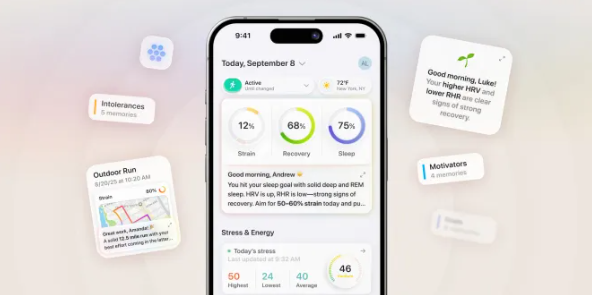When your smartwatch tracks sleep, fitness apps track steps, and nutrition software calculates calories, but no one tells you "how these data are connected" — the real gap in health tech may not be more devices, but an AI brain that can understand your overall condition. Recently, New York-based health tech startup Bevel announced a $10 million Series A funding round (led by General Catalyst), as its AI health assistant quickly becomes one of the fastest-growing health apps in the U.S. with a "pure software + multi-device integration" model.

8x Growth, 80% Retention: Users Open the Health App 8 Times a Day
Bevel, which was founded only two years ago, has seen user growth of more than 8 times in the past year, with daily active users exceeding 100,000. More remarkably: 90-day user retention is over 80%, and on average, each person opens the app 8 times a day. In an industry where health apps often face the problem of "three-minute enthusiasm" (users leave after achieving short-term goals), this data is nothing short of a miracle.
"We don't see health as a phase, but as a continuous journey," said co-founder and CEO Grey Nguyen. "Bevel will learn from your daily habits and drive small yet long-term cumulative changes."
No New Hardware Needed: Use Your Existing Devices to Build a Complete Health Picture
Different from competitors like Whoop or Oura Ring, which rely on expensive proprietary hardware, Bevel insists on a pure software approach — users don't need to buy an additional $500 ring or wristband. Instead, they just need to authorize Bevel to access existing wearable devices like Apple Watch and Garmin, as well as continuous glucose monitors like Dexcom and Libre, and unify all the data through Apple Health.
"Most people have already generated a lot of health data, but no one helps them connect it," said co-founder Aditya Agarwal (former Dropbox CTO and early Facebook engineer). "What we want to do is make health intelligence truly accessible."
Currently, Bevel costs only $6 per month (or $50 annually), significantly lowering the barrier to entry.
From Chronic Back Pain to AI Insights: Founders' Personal Struggles Gave Birth to the Product
Bevel's origin stems from real pain. At the end of 2023, Nguyen suffered from chronic back pain due to the high-pressure life of entrepreneurship. Despite frequent doctor visits and wearing multiple wearable devices, he could never find the cause. It wasn't until he manually integrated sleep, diet, and activity data that he discovered: prolonged sitting caused muscle stiffness, the mattress caused sleep interruptions, and a high-sodium diet worsened inflammation — multiple small factors combined to eventually cause a chronic issue.
Similarly, Agarwal also fell into burnout from overworking and rebuilt his health by manually recording data. The two realized: health isn't about optimizing a single metric, but about systemic balance. So they created Bevel Intelligence — an AI engine that understands individual differences and dynamically adjusts recommendations, capable of analyzing how stress, exercise, and nutrition interact and providing personalized intervention plans.
Investors Are Optimistic About the New Paradigm of "Health Intelligence"
In addition to this Series A round, Bevel had previously received a $4 million seed round investment from South Park Commons and General Catalyst. Investors believe that Bevel is shifting health from "passive treatment" to "active management." Its high user retention proves that it has been integrated into daily life, rather than being a "use-and-discard" tool.
Looking ahead, Bevel plans to expand more health services and partners, but clearly states it will not develop its own hardware, instead focusing on deepening its software intelligence and data integration capabilities.
